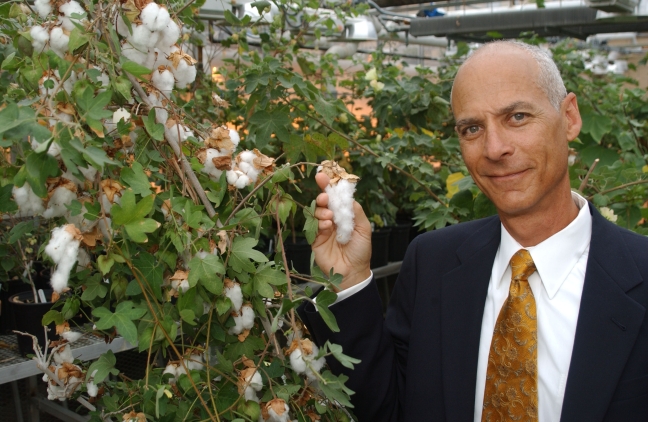
Jonathan Wendel, a Distinguished Professor in Liberal Arts and Sciences in the ecology, evolution and organismal biology department, has been elected to the American Academy of Arts and Sciences. Photo courtesy of Jonathan Wendel. Larger image.
AMES, Iowa – Jonathan Wendel, an evolutionary biologist who has helped shed light on the process and importance of genome doubling in plants, has been elected to the American Academy of Arts and Sciences.
Wendel, a Distinguished Professor in Liberal Arts and Sciences, has been an Iowa State University faculty member in the ecology, evolution and organismal biology department since 1986, including 15 years as department chair. He said he was astounded to learn Tuesday that he is among the academy’s 2023 class of 269 new members, a group that includes playwright Lin-Manuel Miranda and actor Michelle Yeoh.
“It’s an otherworldly feeling. The thought that any of my distinguished colleagues would spend their valuable time to nominate me is so warming and humbling,” Wendel said. “I tell students we live in a golden era of biology, and I feel like I have had a ringside seat in its development.”
Iowa State leaders said the recognition is highly deserved and shows the impact of Wendel’s research, which focuses on how polyploidy – genome doubling – shapes the evolution of plants.
“Dr. Wendel’s election to the academy is well-earned recognition of his groundbreaking work in cotton genome sequencing and its far-reaching benefits for a variety of crop producers. Dr. Wendel is an exemplar of the extraordinarily talented faculty we have at Iowa State University,” said Wendy Wintersteen, Iowa State’s president.
"This honor speaks volumes about Jonathan's contributions to his field," said Beate Schmittmann, dean of the College of Liberal Arts and Sciences. "Throughout his illustrious career, his collaborative research continues to transform the study of crop genetics and evolution, and especially cotton. Known simply as ‘Mr. Cotton,’ his leadership and service helped open doors in research and learning for hundreds of students and faculty. And all of his work at Iowa State University has improved crop production throughout the world, applicable to global issues like food supply and sustainability."
Wendel said he has been fascinated by plant diversity since childhood, an interest that inspired him to study the evolutionary processes of plants.
“I was enthralled by the idea that you could figure out how everything was related to everything else in nature,” he said. “I was just following my curiosity, really.”
Scientists have been aware for decades that some organisms and most plants have more than two sets of genomes in their chromosomes, but new research continues to show how essential polyploidy is to genetic changes in plants over the vast sweep of evolutionary time, Wendel said.
“That’s my guiding light now, figuring out the dimensions of the wondrous cycles of polyploidy,” he said.
More than 14,000 scientists, artists, scholars, politicians, educators and other leaders have been elected to the American Academy of Arts and Sciences since its founding in 1780. Members include Bob Dylan, Benjamin Franklin, Bill Gates, Stephen Hawking, Martin Luther King Jr., Margaret Mead, Jonas Salk and Oprah Winfrey. Wendel, the fourth Iowa State faculty member elected to the academy, is one of 10 new members being honored for accomplishments in the study of evolution and ecology.
“With the election of these members, the academy is honoring excellence, innovation, and leadership and recognizing a broad array of stellar accomplishments,” David W. Oxtoby, the academy’s president, said in a statement. “We hope every new member celebrates this achievement and joins our work advancing the common good.”
According to the academy’s website, the organization was founded during the Revolutionary Way to honor excellence and to convene leaders from every field of human endeavor to examine new ideas, to address issues of importance to the young nation and the world, and to work together “to cultivate every art and science which may tend to advance the interest, honor, dignity and happiness of a free, independent and virtuous people.”
Wendel and other new members will be formally inducted into the academy in late September in Cambridge, Massachusetts.